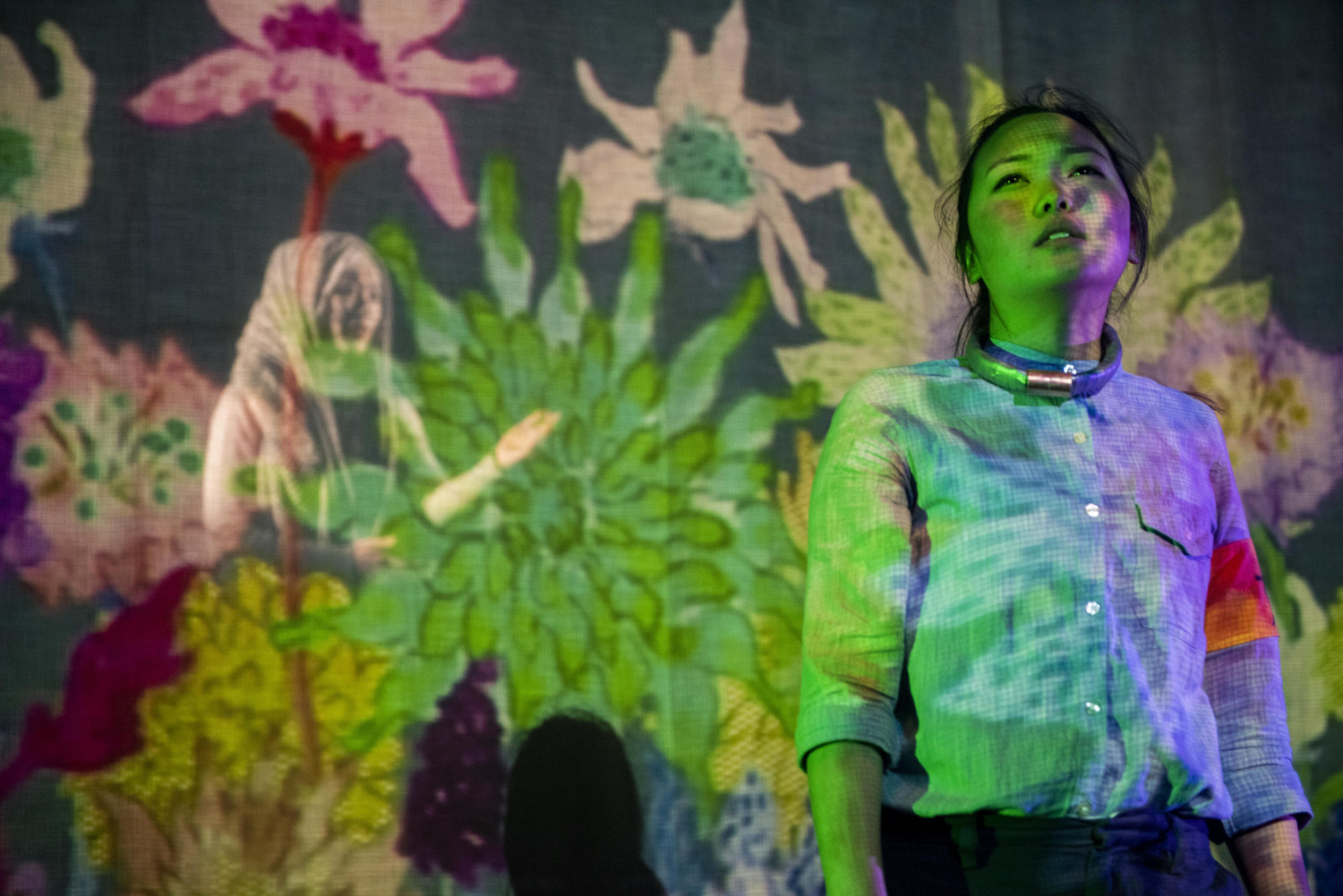Review: YELLOW RABBIT Places Fear and Human Instinct in the Spotlight

Amanda Zhou and April Leung. Photo: Cesar Ghisilieri.
In a desolate world, to what lengths are people willing to go to feel safe? In YELLOW RABBIT, produced by Silk Bath Collective and Soulpepper and directed by Jasmine Chen in its world premiere, two people must determine what they value most, and suffer greatly at the hands of the leader of a refuge in China called Rich-Man Hill.
Even before the show begins, a looping audio track of Mother (Amanda Zhou) reminding listeners that Rich-Man Hill is a place of protection sets an eerie tone. At opening, loud gusts of wind blast through the theatre, before lights reveal two characters - Man (En Lai Mah) and Woman (April Leung) dressed in layers of brown and beige futuristic garb (costumes by Jackie Chau). They are welcomed to the facility, and the process through which they'll be tested to determine their compatibility and suitability to the safe haven is explained by mother over a PA system. Child (Bessie Cheng), the facility worker who 'greets' them by conducting invasive and painful tests on the pair ensures that they're appropriate for relocation. From that moment on, Man and Woman clash and collide as they complete several tests over a few days.
The dynamic between the central characters is intriguing throughout, with Mah playing the self-serving man who simply wants to feel safe for once. In stark contrast to him is Leung as his assigned partner, whose moral compass points due north in her advocation for the rights of all Chinese people. The two leverage their own abilities while leaning on the other, resulting in the well-roundedness of each character.
In fact, one of the strengths of YELLOW RABBIT is its ability to establish and build a world in such a limited timeframe - the show barely passes an hour in length, and in that time explains how the world has changed, what Man and Woman are running from, and who they are at their core. Both harbour secrets that could jeopardize their position in Rich-Man Hill, and while the pair have a few hilarious scenes - one of which involves an Ikea furniture-centric challenge, while another has the Mah in a frantic panic while Leung attempts to coach him through a musical task - it's their ability to deliver tense, gut-wrenching moments that proves their dramatic ability.
In a scene following a difficult moment for Leung, Mah enters with the responsibility of helping her bathe. He comes across as sincere and respectful, and his openness in that moment helps place his character in a brighter light. Leung's physicality during the same scene is solid and frightening in it's delivery, especially given the contrast to her previous actions.
As the aging facility leader Mother, Zhou dances between the commanding, terrifying matriarch and the feeble, paranoid woman gracefully. While she directs Man and Woman through their assignments, she only really interacts with Child, who displays a real sense of conflict; she sees potential in the facility and the world but is bound to her Mother's instructions - literally - by the collar around her neck. Cheng and Zhou elevate and establish the family dynamic within the show, and their post-challenge interactions are filled to the brim with familial guilt and love.
The use of both Mandarin, Cantonese and English in the play elevates the subject matter well, however a few unassigned subtitle projections, and the removal of subtitles in the final scenes, makes understanding the dialogue a bit more difficult at times - kudos to both Cheng and Zhou for their Mandarin dialogue without translation, as their acting conveys what they're saying clearly. Additionally, there were several moments where cast spoke too quickly for their lines to be clear, however this doesn't detract from their scenes enough to cause overall misunderstanding.
The use of video and projections (Zeesy Powers) alongside lighting (Jareth Li) against the hanging drapes and transparent screens (sets by Jackie Chau) adds to the facilities' stark environment, and enhances scenes involving them to great success.
YELLOW RABBIT's ability to establish a cruel world, fuelled by racism from external and internalized sources, is better than some full-length feature films, which only highlights the abilities of writers Cheng, Aaron Jan, and Gloria Mok. The story's introspective nature is entirely realistic as it places two fundamentally different, yet extremely human, individuals in dire circumstances and invites the audience to analyze and judge their actions.
In doing so, the audience almost becomes Mother themselves - watching how two frightened people handle themselves and each other in their desperate attempt to achieve a safe, secure life. This is a show that takes the core elements of what it means to be human, what it means to be marginalized, and the necessity of adaptation in an ever-changing world.
YELLOW RABBIT runs through December 1 at the Young Centre for the Performing Arts, 50 Tank House Lane, Toronto, ON.
For more information or to buy tickets visit https://soulpepper.ca/performances/yellow-rabbit/6170
Videos
